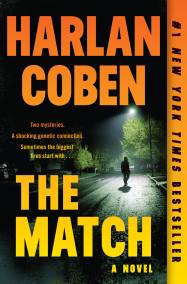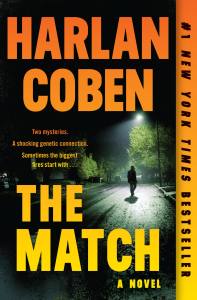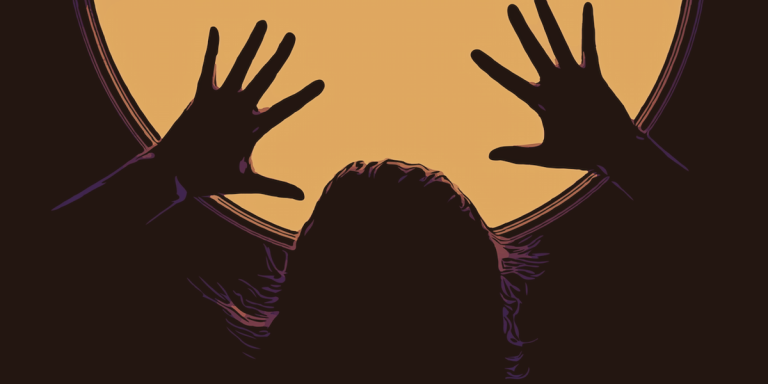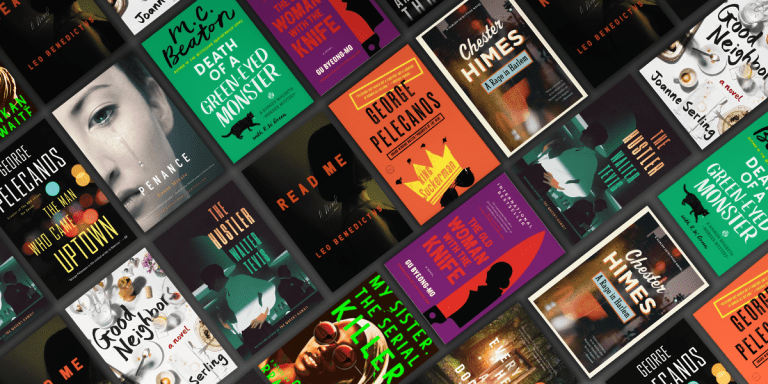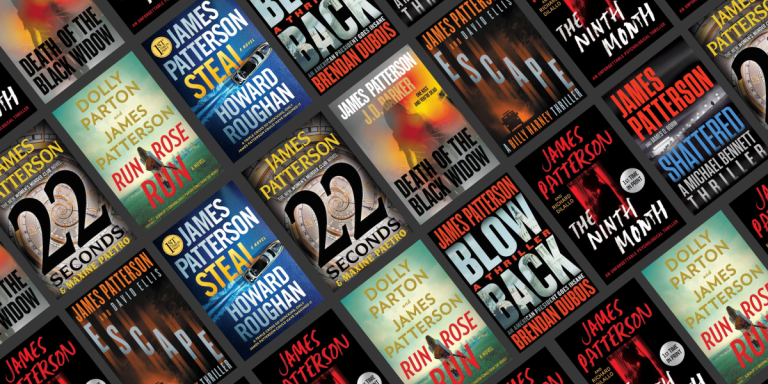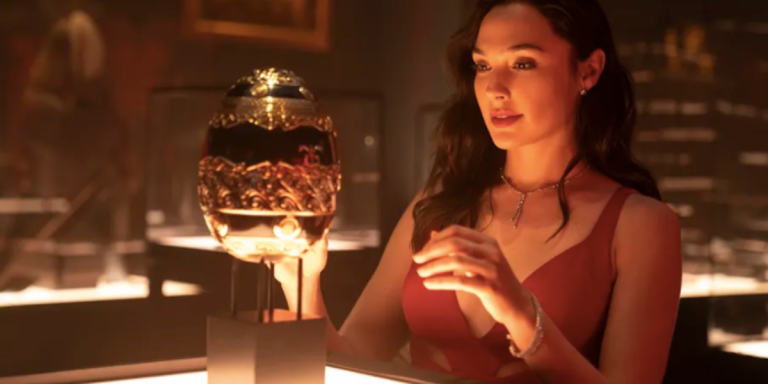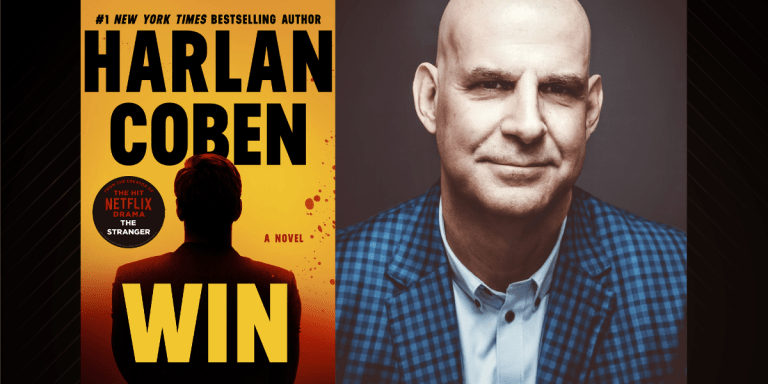Read the Excerpt: The Match by Harlan Coben
CHAPTER ONE
At the age of somewhere between forty and forty-two—he didn’t know exactly how old he was—Wilde finally found his father.
Wilde had never met his father. Or his mother. Or any family member. He didn’t know their names or where he was born or when or how he, as a very young child, ended up living alone in the woods of the Ramapo Mountains, fending for himself. Now, more than three decades after being “rescued” as a little boy— “abandoned and feral!” one headline had put it; “a modern-day mowgli!” shouted another—Wilde sat no more than twenty yards from a blood relative and the elusive answers to his mysterious origin.
His father’s name, he had recently learned, was Daniel Carter. Carter was sixty-one years old and married to a woman named Sofia. They had three grown daughters—Wilde’s half sisters, he assumed—Cheri, Alena, and Rosa. Carter lived in a four-bedroom ranch on Sundew Avenue in Henderson, Nevada. He worked as a residential general contractor for his own company, DC Dream House Construction.
Thirty-five years ago, when young Wilde was first discovered living alone in the woods, doctors estimated his age to be between six and eight years old. He had no memory of parents or caregivers or any life other than scrounging around to survive in those mountains alone. That little boy stayed alive by breaking into empty cabins and summer homes, raiding the refrigerators and pantries. Sometimes he slept in empty homes or in tents he’d stolen from garages; mostly, if the weather was cooperative, young Wilde liked to sleep outside under the stars.
He still did.
After he was located and “rescued” from this untamed existence, Child Services placed the little boy with a temporary foster family. With the onslaught of media attention, most speculated that someone would come forward immediately and claim “Little Tarzan.” But days turned into weeks. Then months. Then years. Then decades.
Three decades.
No one ever came forward.
There were rumors, of course. Some believed that Wilde had been born into a mysterious and secretive local mountain tribe, that the little boy had run off or been handled in a somewhat negligent manner, and so the tribespeople feared admitting he was one of their own. Others theorized that the little boy’s memories were faulty, that he couldn’t really have survived on his own in the harsh woods for years, that he was too articulate and intelligent to have raised himself with no parents. Something awful had happened to little Wilde, these people surmised—something so traumatic that the boy’s coping mechanism had blocked out all memory of the incident.
That wasn’t true, Wilde knew, but whatever.
His only early memories came in incomprehensible snap-flash visions and dreams: a red banister, a dark house, a portrait of a man with a mustache, and sometimes, when the visions decided to be audible, a woman screaming.
Wilde—his foster father had come up with that apropos name—became something of an urban legend. He was the local boogeyman who lived alone in the mountains. If parents in the Mahwah area wanted to make sure that their offspring came home at sunset—if they wanted to discourage them from wandering through those miles of thicket and trees—they’d remind their children that once darkness set in, the Boy from the Woods would come out of hiding—angry, feral, thirsting for blood.
Three decades had gone by and still no one, including Wilde, had a clue about his origin.
Until now.
From his rental car parked across the street, Wilde watched Daniel Carter open the front door and head toward his pickup truck. He zoomed in on his father’s face with his iPhone camera and snapped a few photos. He knew that Daniel Carter was currently working on a new town house development—twelve units, each with three bedrooms, 2.5 baths, and according to the website, a kitchen with “charcoal-colored cabinetry.” Under the “about” section of DC Dream House Construction’s website, it read, “For twenty-five years, DC Dream House Construction has designed, built, and sold top-quality, top-value homes that are personalized to meet your needs and dreams.”
Wilde texted three of the photos to Hester Crimstein, a renowned New York City attorney and probably the closest thing he had to a mother figure. He wanted Hester’s take on whether she thought there was any resemblance between himself and the man who was supposed to be his biological father.
Five seconds after hitting send, Hester called him. Wilde answered and said, “Well?”
“Whoa.”
“‘Whoa’ as in he looks like me?”
“If he looked any more like you, Wilde, I’d think you were using age-progression software.”
“So you think—”
“It’s your father, Wilde.”
He just held the phone to his ear.
“You okay?” Hester asked.
“Fine.”
“How long have you been watching him?”
“Four days.”
“So what are you going to do?”
Wilde thought about that. “I could just leave well enough alone.”
“Nah.”
He said nothing. “Wilde?”
“What?”
“You’re being a candy-ass,” Hester said.
“Candy-ass?”
“My grandson taught me that phrase. It means coward.”
“Yeah, I got that.”
“Go talk to him already. Ask him why he left a little boy alone in the woods. Oh, then call me immediately because I’m super curious.”
Hester hung up.
Daniel Carter’s hair was white, his skin sun-kissed, his forearms ropey probably from a lifetime of manual labor. His family, Wilde had observed, seemed pretty tight. Right now, his wife, Sofia, was smiling and waving goodbye as he got into his pickup truck.
The past Sunday, Daniel and Sofia had a family barbecue in their backyard. Their daughters Cheri and Alena and their families had been there. Daniel worked the grill wearing a chef’s hat and an apron reading “Trophy Husband.” Sofia served sangria and potato salad. When the sun dropped low, Daniel lit the firepit, and the entire family actually roasted marshmallows and played board games, like something out of a Rockwell painting. Wilde expected to feel a pang as he watched them, pondering on all he had missed, but in truth he felt very little.
It wasn’t a better life than his. It was just different.
A big part of him wanted to drive to the airport and fly home. He had spent the last six months living something of a normal, domestic existence in Costa Rica with a mother and her daughter, but now it was time to return to his remote Ecocapsule deep in the heart of the Ramapo Mountains. That was where he belonged, where he felt most at home.
Alone. In the woods.
Hester Crimstein and the world at large may be “super curious” about the origin of “The Boy from the Woods,” but the boy himself was not. He had never been. In his view, his parents were either dead or had abandoned him. What difference did it make who they were or what their reason was? It wouldn’t change anything, at least not for the better.
Wilde was good, thank you very much. There was no reason to add unnecessary upheaval to his life.
Daniel Carter turned the ignition key of the pickup truck. He headed down Sundew Avenue and made a left on Sandhill Sage Street. Wilde followed. A few months back, Wilde had succumbed to the temptation and reluctantly put his DNA into one of those online genealogy databases that were all the rage. It didn’t mean anything, he told himself. If a match came in, he could still ignore it if he chose to. It was a noncommittal first step, nothing more.
When the results came in, there was nothing earth-shattering. His closest match was someone with the initials PB, whom the site described as a second cousin. Big deal. PB reached out. Wilde was about to respond, but life ended up throwing him a massive curveball. Surprising even himself, Wilde ended up leaving the woods he had always called home for an unconventional attempt at family life in Costa Rica.
It hadn’t gone as planned.
Two weeks ago, while packing to leave Costa Rica, the DNA genealogy site had sent him an email with the subject: “important update!” They’d matched him to “a relative sharing far more DNA” than “any other in your relative chain.” This account went by the initials DC. At the bottom of the email, a hyperlink urged him to “learn more!” Against his better instincts, he clicked it. DC was, according to the age, gender, and match percentile, Wilde’s father.
Wilde had just stared at the screen.
Now what? The door to his past was right in front of him. All he had to do was turn the knob. Still, Wilde hesitated. Didn’t this crazy, intrusive website work the other way too? If Wilde had received notification that his father was on the site, didn’t it stand to reason that his father received one saying that his son was here too?
Why didn’t DC reach out to him?
For two days, Wilde let it go. At one point, he almost deleted his entire genealogy profile. No good could come of this. He knew that. Over the years, he had gone through all the possible machinations that might explain how a little boy had ended up in the woods, left alone for years, left (if we want to be frank) to die.
When he’d called Hester about this paternal match and his reluctance to pursue it, she’d said, “You want my take?”
“Sure.”
“You’re a schmuck.”
“Helpful.”
“Listen to me closely, Wilde.”
“Okay.”
“I’m a lot older than you.”
“True.”
“Quiet. I’m about to drop some knowledge on you.”
“Did you get that line from Hamilton?”
“I did.”
He rubbed his eyes. “Continue.”
“The ugliest truth is better than the prettiest lie.”
Wilde frowned. “Is that from a fortune cookie?”
“Don’t be a wiseass. You can’t walk away from this. You know that. You need to know the truth.”
Hester was, of course, right. He may not want to turn that knob, but he couldn’t spend the rest of his life staring at the door either. He signed back onto the DNA site and wrote a message to DC. He kept it short and simple:
I may be your son. Could we speak?
When he hit send, an auto-reply bounced back. According to the website, DC was no longer in the database. That was both suspicious and odd—his father choosing to delete his account—but it suddenly hardened Wilde’s resolve to get answers. Screw turning the doorknob; it was time to kick the damn door down. He called Hester back.
If Hester’s name seems familiar, it could be because she’s legendary television attorney Hester Crimstein, host of Crimstein on Crime. She made some calls, used her connections. Wilde worked some other sources from his own years in what is dubiously dubbed “freelance security.” It took ten days, but eventually they got a name:
Daniel Carter, age sixty-one, of Henderson, Nevada.
Four days ago, Wilde flew from Liberia, Costa Rica, to Las Vegas, Nevada. Now here he was, in a blue Nissan Altima rental, following Daniel Carter’s Ram pickup truck to a construction site. He had stalled long enough. When Daniel Carter pulled up to the town house development, Wilde parked on the street and got out of the car. The construction noise was in full throat, deafening. Wilde was about to make his move when he saw two workers approach Carter. Wilde waited. One man handed Carter a hard hat. The other handed him some sort of earplugs. Carter put them all on and led his cohorts into the heart of the development. Their work boots kicked up desert dust to the point where it was hard to see them. Wilde watched and waited. A sign put up with two-by-fours announced in too-ornate a font that vista mews—could you come up with a more generic name?—would feature “three-bedroom luxury town houses” with a starting price of $299,000. A red banner slashing left to right read: “coming soon!”
Daniel Carter might have been the foreman or general contractor or whatever you might call the boss, but the man clearly didn’t mind getting his hands dirty. Wilde watched as he led his workers by example. He hammered in a beam. He threw on protective goggles and drilled. He inspected the work, nodding toward his employees when he was happy, pointing out deficiencies when he wasn’t. The workers respected him. Wilde could tell. Or maybe Wilde was projecting. Hard to know.
Twice Wilde saw Daniel Carter alone and started to make his approach, but someone always got there first. The site was busy, in constant motion, loud. Wilde hated loud noises. Always had. He decided to wait and catch his father when he got back home.
At five p.m., the workers started to leave. Daniel Carter was one of the last. He waved goodbye and hopped into his pickup. Wilde followed him back to the ranch on Sundew Avenue.
When Daniel Carter turned off the ignition and stepped out of the truck, Wilde pulled up and parked in front of his house. Carter spotted Wilde and stopped moving. The front door of the ranch opened. His wife, Sofia, greeted him with an almost celestial smile.
Wilde slid out of the car and said, “Mr. Carter?”
His father stayed by the open truck door, almost as though he were debating getting back in and driving away. Carter took his time, staring warily at the interloper. Wilde wasn’t sure what to say next, so he went with the simplest:
“Could I have a word with you?”
Daniel Carter glanced toward Sofia. Something passed between them, the unspoken language of a couple who had been together some three decades, Wilde assumed. Sofia stepped back inside and closed the door.
“Who are you?” Carter asked.
“My name is Wilde.” He took a few steps closer so that he wouldn’t have to shout. “I think you’re my father.”
CHAPTER TWO
Daniel Carter didn’t say much.
He listened quietly while Wilde explained about his past, about the DNA genealogy site, about reaching the conclusion that they were most likely father and son. Carter kept his expression neutral throughout, nodding every once in a while, wring- ing his hands maybe, losing a little color in his face. Carter’s stoicism
impressed Wilde, reminded him, oddly enough, of himself.
They were still in the front yard. Carter kept sneaking glances back at his house. Finally, he said, “Let’s take a drive.”
They got in the pickup truck and drove in silence, neither feel- ing the need to talk. Wilde assumed that his words had stunned Carter, that Carter was using the drive like a boxer uses the standing eight count. But maybe not. Hard to read people. He could be stunned. He could be cunning.
Ten minutes later, they slid into a booth at Mustang Sally’s, a sixties-themed diner located inside a Ford car dealership. The booth had red vinyl seating and tried very hard to bring on nostalgia, but when you come from New Jersey, faux diners just don’t cut it.
“You after money?” Carter asked him.
“No.”
“I didn’t think so.” He let loose a long breath. “I guess I could start off by doubting your claim.”
“You could,” Wilde agreed. “We could do a paternity test.”
“We could.”
“But I don’t really see the need. There is a resemblance between us.”
Wilde said nothing.
Carter ran his hand through his white mane of hair. “Man, this is weird. I have three daughters. Did you know that?”
Wilde nodded.
“Greatest blessings of my life, those girls.” He shook his head. “You’re going to have to give me a few minutes with this, okay?”
“Okay.”
“I know you have a ton of questions. So do I.”
A young waitress came over and said, “Hey, Mr. C.” Daniel Carter gave her a warm smile.
“Hey, Nancy.”
“How’s Rosa?”
“She’s doing great.”
“Tell her I say hey.”
“I sure will.”
“What can I get you fellas?”
Daniel Carter ordered a club sandwich with fries. He gestured toward Wilde, who ordered the same. Nancy asked if they wanted anything to drink. Both men shook their heads at the same time. Nancy picked up the menus and left.
“Nancy Urban went to high school with my youngest,” Carter said when she was out of earshot.
“Great kid.”
“Uh-huh.”
“They both played on the same volleyball team.”
“Uh-huh,” Wilde said again.
Carter leaned in a little. “I really don’t get this.”
“That makes two of us.”
“I can’t believe what you’re telling me. You’re really that little boy they found in the woods all those years ago?”
“I am,” Wilde said.
“I remember the news stories. They called you Little Tarzan or something. Hikers spotted you, right?”
“Yes.”
“In the Appalachians?”
Wilde nodded. “The Ramapo Mountains.”
“Where are those?”
“New Jersey.”
“Seriously? The Appalachians reach New Jersey?”
“They do.”
“I didn’t realize that.” Carter shook his head again. “I’ve never been to New Jersey.”
So there you had it. His birth father had never been to the state Wilde had called home his whole life. Wilde wasn’t sure what, if anything, to make of that.
“You don’t think of New Jersey as having mountains,” Carter said, trying to grasp at anything. “I think more about overcrowding and pollution and Springsteen and The Sopranos.”
“It’s a complicated state,” Wilde said.
“So’s Nevada. You can’t believe the changes I’ve seen.”
“How long has Nevada been home for you?” Wilde asked, trying to gently steer the conversation.
“I was born near here, in a town called Searchlight. Ever heard of it?”
“No.”
“It’s about forty minutes south of here.” He pointed with his finger, as though that was helpful, then he looked at the finger, shook his head, put his hand down. “I’m making small talk for no good reason. I’m sorry.”
“It’s fine,” Wilde said.
“It’s just . . . a son.” His eyes may have been welling up. “I’m having trouble wrapping my head around that.”
Wilde said nothing.
“Let me tell you one thing right off the top, okay, because I’m sure you’re wondering.” He dropped his voice. “I didn’t know about you. I didn’t know I had a son.”
“When you said ‘didn’t know’—”
“I mean, never. Not until this very moment. This is all a complete shock to me.”
Something cold coursed through Wilde. He had waited for answers like this his whole life. He had blocked on it, pretended that it didn’t matter, and in many ways it didn’t, but of course, the curiosity was there. At some point he’d decided that he wouldn’t let the unknowable define him. He had been left in the woods to die and somehow survived. That obviously changed a person, molded them, was part of everything they did or became.
“Like I said, I have three daughters. To find out now, all these years later, that I had a son before any of them were even born . . . ” He shook his head and blinked his eyes. “Oh boy, I have to get acclimated to this. Just give me a little time to catch my breath.”
“Take your time.”
“You said they call you Wilde?”
“Yes.”
“Who named you that?”
“My foster father.”
“Apropos,” Carter said. Then: “Was he good to you? Your foster father?”
Wilde didn’t like being on the answering end here, but he said “Yes,” and left it at that.
Carter still wore his work shirt. There was a film of dust on it. He reached into the breast pocket and pulled out a pen and reading glasses. “Tell me again when you were found.”
“April of 1986.”
Carter wrote that down on the paper mat. “And they guessed you were how old?”
“Six, seven, something like that.”
He wrote that down too. “So that means, give or take a year, you were born around 1980.”
“Yes,” Wilde said.
Daniel Carter nodded, his eyes on his writing. “My guess would be, Wilde, that you were conceived sometime in the summer of 1980 and born nine months later, so that would be, what, between March and May of 1981.”
A small vibration shook the table. Carter picked up his mobile phone and squinted at the screen. “Sofia,” he said out loud. “My wife. I better answer it.”
Wilde managed to gesture for him to go ahead.
“Hey, hon . . . Yeah, I’m at Mustang Sally’s.” As he listened, Carter flicked his gaze toward Wilde. “A supplier. He’s bidding to get the PVC pipe order. Right, yeah, I’ll tell you about it later.” Another pause before he added a very sincere, “Love you.”
He hung up and put the phone back on the table. He stared at it for a long time.
“That woman is the best thing that ever happened to me,” he said. Still staring at the phone, he added, “It must have been hard on you, Wilde. Not knowing about your past. I’m sorry.”
Wilde said nothing.
“Can I trust you?” Carter asked. Before Wilde could respond, Daniel Carter waved him off. “Dumb question. Insulting even. I have no right to ask anything from you. And a man either keeps his word or he doesn’t. Asking him isn’t going to change anything. The biggest liars I’ve ever met are the best at making promises and holding eye contact.”
Carter folded his hands and put them on the table. “I guess you’re here for answers.”
Wilde didn’t trust his voice, so he nodded.
“I’ll tell you what I can, okay? I’m just trying to think of where to start. I guess with . . . ” He looked up in the air, blinked, dove in. “So Sofia and I started dating our senior year of high school. Fell in love pretty fast. We were kids though. You know how it is.
Anyway, Sofia is a lot smarter than me. When we graduated, she went to college. Out of state. In Utah. First in her family to attend college. I joined the air force. Did you serve?”
“Yes.”
“What branch?”
“Army.”
“Did you see action?” he asked.
Wilde didn’t like to talk about it. “Yes.”
“I didn’t. My age, I was lucky. After Vietnam, I mean in the seventies and up until Reagan bombed Libya in 1986, it felt like we’d never go to war again. I know how weird that sounds now, but it’s true. That’s what Nam did to our psyche. Gave us a nationwide case of PTSD, which maybe was a good thing. I was mostly stationed at Nellis, maybe half an hour from here, but I also did short stints overseas. Ramstein in Germany. Mildenhall in the UK. I didn’t fly or anything. I worked Pavement and Construction Equipment, basically building bases. It’s where I learned about construction.”
Waitress Nancy interrupted. “The fries were ready, so I brought them out first. They’re best when they’re hot.”
Carter snapped on the wide, charming smile. “Well, isn’t that thoughtful of you? Thank you, Nancy.”
Nancy Urban set down the big basket of fries between the two men and put small plates in front of them. There was already ketchup on the table, but Nancy moved the bottle to the center, as though to remind them it was there. When she left, Carter reached out and grabbed a single fry.
“Sofia and I got engaged right before I left for my summer assignment at Ramstein. We were still really young, and I was worried about losing her. She was meeting all these cool people at college. Every high school couple I knew had already broken up—or had a shotgun marriage because they were pregnant. Anyway, I bought an engagement ring from a pawnshop of all places.” He narrowed his eyes. “Do you have any trouble with alcohol, Wilde?”
“No.”
“Drugs? Any kind of addiction?”
Wilde shifted in the booth. “No.”
Carter smiled. “I’m glad to hear that. I had about with alcohol, though I’m twenty-eight years sober. But I can’t blame that. Not really. The long and short of it? I had a crazy summer in Europe. I figured it was my last chance as a single man, and stupidly I thought I should sow my wild oats or whatever nonsense we men used to justify acting out that way. That summer was the only time I cheated on Sofia, and sometimes, even after all these years, I look over at her sleeping and feel guilty. But I did it. One-night stands, we used to call it. Heck, I think people probably still call them one-night stands, don’t they?”
He looked at Wilde as though he expected him to answer. “I guess,” Wilde said to keep the conversation going.
“Right. You married, Wilde?”
“No.”
“Not my business, sorry.”
“It’s okay.”
“Anyway, I slept with eight girls the summer of 1980. Yep, I know the exact number. How pathetic is that? Other than Sofia, they are the only women I’ve had sex with in my entire life. So the obvious conclusion here is that your mother is one of those eight women.”
Conceived during a one-night stand, Wilde thought. Did that matter? Wilde couldn’t see how. Perhaps there was some irony in the fact that Wilde was most comfortable in short-term situations or, more bluntly, one-night stands. He’d had girlfriends, women he tried to connect with, but somehow it never quite worked out.
“Those eight women,” Wilde said.
“What about them?”
“Do you have their names or addresses?”
“No.” Carter rubbed his chin, his eyes turning upward. “I only remember a few first names, sorry.”
“Did any ever reach out to you?”
“You mean after? No. I never heard from any of them again. You have to remember. This was 1980. None of us had mobile phones or emails. I didn’t know their last names, they didn’t know mine. Do you ever listen to Bob Seger and the Silver Bullet Band?”
“Not really.”
A wistful smile crossed his face. “Oh man, you’re missing out. I bet you’ve heard ‘Night Moves’ or ‘Turn the Page.’ Anyway, in ‘Night Moves,’ Bob sings, ‘I used her, she used me, but neither one cared.’ That’s what it was like for me that summer.”
“So they were all one-night stands?”
“Well, one girl was a weekend fling, I guess. In Barcelona. So that was more like three nights.”
“And they only knew you as Daniel,” Wilde said. “I go by Danny mostly, but yeah.”
“No last names. No addresses.”
“Right.”
“Did you tell them you were a soldier or where you were stationed?”
He thought about that. “I may have.”
“But even if you did,” Wilde continued, “Ramstein is huge. Over fifty thousand Americans.”
“You’ve been?”
Wilde nodded. He had spent three weeks there training for a secret mission in northern Iraq. “So if a young woman got pregnant and she wanted to find the father and came to the base looking for a Danny or Daniel—”
“Hold up,” Carter interrupted. “Do you think your mother looked for me?”
“I don’t know. It’s 1980. She’s pregnant. Maybe. Or maybe not. Maybe she was just one-night-standing too. Maybe she had one-night stands with a bunch of guys and didn’t know or care who the father was. I don’t know.”
“But you’re right,” Carter said, his face seeming to drain of color. “Even if she tried to find me, she would never have been able to locate me at that base. And I was only there for eight weeks. I may have even been back stateside by the time she’d learned that she was pregnant.”
Nancy came back with their sandwiches. She placed one platter in front of Carter, one in front of Wilde. Her eyes danced between the two. Sensing the mood, Nancy hurried away.
“Eight women,” Wilde said. “How many of them were Americans?”
“What difference does that make?” Then: “Oh right, I see. You were left in the woods in New Jersey. It would stand to reason that your mother would be American.”
Wilde waited.
“Only one. I mostly met the girls in Spain. It was like spring break for all kinds of Europeans back then.”
Wilde tried to keep his breathing even. “What do you remember about her?”
Carter picked up a single french fry, held it between his thumb and forefinger. He stared down at it as though it might give him the answer. “I think her name was Susan.”
“Okay,” Wilde said. “Where did you meet Susan?”
“A discotheque in Fuengirola. That’s a town on the Costa del Sol. I remember saying hi to her and being surprised when I heard her accent because there were so few Americans who vacationed down there.”
“So you’re at the disco,” Wilde continued. “Try to think back. Who were you with?”
“Some guys from my regiment, I guess. I don’t remember. Sorry. They may have been there. We’d bounce from disco to disco.”
“Did Susan tell you where she was from?”
Carter shook his head. “In fact, I can’t even say for sure she was American. Like I said, we rarely saw young American girls down there. It wasn’t a spot for them back in 1980. But her accent was clearly American, so I’m guessing she was from here. I also had a lot to drink. I remember dancing with her. That’s what you did. You danced hard and sweaty and then you left.”
“Where did you two go?”
“A couple of us had chipped in for a room at a hotel.”
“Do you remember the name of the hotel?”
“No, but it was right near the nightclub. A high-rise. I remember it was round.”
“Round?”
“Yeah. It was a round high-rise. Distinctive. Our room had a balcony. Don’t ask me how I remember that, but I do. If I looked at pictures of hotels online, I could probably figure it out. If it’s still there.”
Like that would make a difference, Wilde thought. Like he could fly over to Spain and visit some hotel and ask them whether a young American woman named Susan had a one-night stand in their hotel in 1980.
“Do you remember when exactly this happened?”
“You mean like the date?”
“Whatever, yes.”
“I think she was later in my stay? Like the sixth or seventh girl, so probably August. But that’s a guess.”
“Was she staying at this round high-rise too?”
He made a face. “I don’t know. I doubt it.”
“Who was she traveling with?”
“I don’t know.”
“When you started talking to her, was she with anyone?”
He slowly shook his head. “I’m sorry, Wilde. I don’t remember.”
“What did she look like?”
“Brown hair. Pretty. But . . . ” He shrugged and said that he was sorry again.
They talked about other possibilities. An Ingrid from Amsterdam. Rachel or Racquel from Manchester. Anna from Berlin. An hour passed. Then another. They eventually ate the sandwiches and the now-cold french fries. Daniel Carter’s phone buzzed several times. He ignored it. They talked, though Carter did the majority of the speaking. Wilde wasn’t one for opening up.
When the phone buzzed yet again, Daniel Carter signaled Nancy for the bill. Wilde said that he would pay it, but Carter shook him off. “I would say it’s the least I could do, but that would be too insulting.”
They got back into the pickup truck and started back toward the house on Sundew Avenue. Both men fell into a silence so thick you could reach out and touch it. Wilde looked out the front windshield at the night sky. He had spent his entire life looking up at the stars, but there was something about the color of the sky just past dusk, the turquoise tint that you only find in the American Southwest.
“Where are you staying tonight?” his father asked.
“The Holiday Inn Express.”
“Nice.”
“Yeah.”
“I need to ask you a favor, Wilde.”
Wilde looked over at his father’s profile. There was no doubting the resemblance to his own. Carter was staring out the front windshield, his gnarled hands gripping the wheel at a perfect ten-and-two-o’clock.
“I’m listening,” Wilde said.
“I got a really nice family,” he said. “Loving wife, wonderful doting daughters, grandkids even.”
Wilde said nothing.
“We are pretty simple people. We work hard. We try to do the right thing. I’ve owned my own business for a long time now. I never cheat anyone. I provide a solid service to my customers. Twice a year, me and Sofia, we take a vacation in an Airstream to a different national park. The girls used to come with us, but now, well, they’ve got families of their own.”
Carter carefully put on his turn signal and steered hand over hand. Then he looked at Wilde.
“I don’t want to drop a grenade on their lives,” he said. “You can understand that, can’t you?”
Wilde nodded. “I can,” he said.
“When I got home from that summer, Sofia met me at the airbase. She asked me about what I’d done over there. I looked her straight in the eye, and I lied. It may seem like a long time ago—and it is, don’t get me wrong—but if Sofia hears now that our marriage was built on that lie . . .”
“I understand,” Wilde said.
“I just . . . can I have a little time? To think about it?”
“Think about what?”
“To think about telling them. If I should tell them. How I should tell them.”
Wilde thought about that. He wasn’t so sure that he wanted any of that either. Did he want three new sisters? No. Did he want or need a father? No. He was a loner. He chose to live by himself in the woods. He was best detached. The only person he felt any real responsibility toward was his godson, Matthew, a high school senior—and the only reason he did was because Matthew’s father, David, Wilde’s only friend, had died because of Wilde’s negligence. He owed the kid. He would always owe him.
There were other people in his life. No man, not even Wilde, was an island.
But did he need this in his life?
When they pulled onto Sundew Avenue, Wilde felt his father stiffen. Sofia and his daughter Alena were on the front stoop.
“How about this?” Daniel Carter began. “We meet for breakfast tomorrow morning. Eight a.m. at the Holiday Inn Express. We discuss it then and make a plan.”
Wilde nodded as Carter pulled into the driveway. Both men hopped out. Sofia hurried toward her husband. Her husband started peddling the PVC pipe supplier story again, but judging by the way she looked at him, Wilde was not convinced that Sofia was buying it. She never took her eyes off Wilde.
When it didn’t seem to be overly rude, Wilde made a production of checking his watch and said that he had to go. He quickly headed toward his rental. He didn’t look back, but he could feel their eyes on him. He slid into the driver’s seat and hit the accelerator. He never, not once, looked over his shoulder. When he got back to the Holiday Inn Express, Wilde packed his bag. There wasn’t much stuff. He checked out, drove to the airport, dropped the car off at the rental dealership.
Then he caught the last flight from Las Vegas back home to New Jersey.
He sat in a window seat and replayed the conversation. He didn’t want to drop grenades on them. He didn’t want to drop grenades on himself.
It’s over, he thought. But he was wrong.
Order the Book
After months away, Wilde has returned to the Ramapo Mountains in the wake of a failed bid at domesticity that confirms what he’s known all along: He belongs on his own, free from the comforts and constraints of modern life.
Suddenly, a DNA match on an online ancestry database brings Wilde closer to his past than he’s ever dreamed, and finally gives Wilde the opening he needs to track down his father. But meeting the man brings up more questions than answers. So Wilde reaches out to his last, most desperate lead, a second cousin who disappears as quickly as he resurfaces, having experienced an epic fall from grace that can only be described as a waking nightmare.
Was his cousin’s downfall a long time coming? Or was he the victim of a conspiracy as cunning as it is complex? And how does it all connect to the man once known as The Stranger, a treacherous fugitive with a growing following whose mission and methods have only turned more dangerous with time?
By clicking 'Sign Up,' I acknowledge that I have read and agree to Hachette Book Group’s Privacy Policy and Terms of Use

